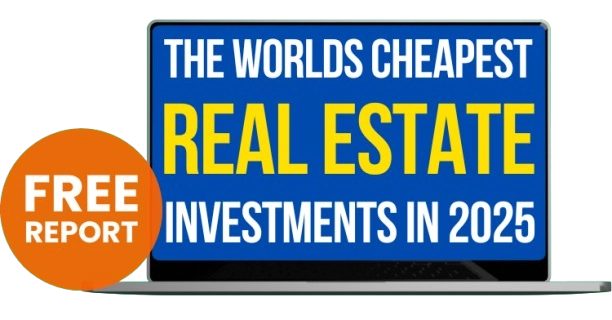Dollar-euro parity?
We’re closing in.
As I write, US$1 equates to 1.01 euro.
The U.S. dollar holder has noteworthy buying power in other parts of the world right now, too…
Including in Colombia and Brazil, for example… two markets you should be paying attention to if you’re shopping the globe for your next property investment.
A currency advantage means that whatever your capital budget… it’ll buy you more.
But currency can work against us global property investors, too… whether we’re looking to buy, rent, or sell… and even if your objective is simply to buy and hold.
Let’s start with the obvious…
When buying property in a foreign currency, the local currency’s exchange rate affects the sales price in dollar terms.
A house costing 100,000 euros would have cost you US$133,000 at an exchange rate of US$1.33 to the euro back in 2013… but only US$101,000 at today’s US$1.01 per euro.
That’s a dramatic difference.
But there’s more to your overall currency exposure than this.
Here are three fundamentals to remember when assessing your overall currency risk related to any property purchase in a foreign market…
1. What Currency Is Being Used For The Property Transaction?
As I showed with my example above, when properties trade in the local currency, the most obvious effect of exchange rates is the cost of your property in dollars. A strong dollar will buy more of the local currency, so you’ll need fewer dollars to come up with the purchase price.
When it’s time to sell, a weak dollar is your friend, because the price you get (in the local currency) will buy more dollars back home.
But not all properties in foreign countries trade in the local currency. Sometimes they trade in dollars.
Of course this is true in countries that use the U.S. dollar like Ecuador, El Salvador, Panama, British Virgin Islands, and Turks and Caicos.
But it’s also true for countries that have their own currencies yet still trade real estate in U.S. dollars. You’ll find this practice in Uruguay, Peru, Nicaragua, Costa Rica, and sometimes Mexico, among many others.
If your foreign property transaction is in dollars, then the exchange rate has no direct effect on the purchase or the sales price.
2. Do You Plan To Live Or Spend Significant Time In-Country?
If you live in the country where your property is located, you’ll find that the exchange rate has the opposite effect on your cost of living as it does on the property value.
That is… while a strong dollar will lower your eventual resale profit in dollar terms, it will also reduce your cost of living, as your dollars are buying more of the local currency. Depending on how much time you spend in the country, your lowered cost of living could offset any depreciation in resale price caused by a strengthening dollar.
Of course, if you’re renting, a strong dollar will reduce your rental cost in a non-dollar country.
The thing to remember here is that a strong dollar lowers your local expenses… while a weak dollar raises them.
3. Are You Managing The Property As A Rental?
Like the local cost of living, your operating expenses for managing a rental will go down as the dollar strengthens. Your utilities, homeowner association fees, and taxes will all cost less in dollar terms.
If you rent your property in dollars, then your rental income will buy more of the local currency. So a strengthening dollar gives you a “raise,” helping with your local expenses. A weakening dollar gives you a pay cut… even though it’s raising the dollar value of your property at resale time.
One way to hedge currency movements is to generate cash flow in the currency of the place where you’re spending time. Purchase a property that you can rent out for income in the local currency, and you can accumulate that income (in a local bank account) to cover both the costs of the rental property and also your living expenses when you’re in town.
It’s important to understand the effects of currency ups and downs on any investment you make in a foreign market, but don’t get distracted trying to beat the system.
A good deal is a good deal. Wait too long and the property you want could be gone. Or, if property prices go up, any savings you may have made on the exchange rate are mitigated or erased.
Bottom line, there is no final whistle to wait for. You are both player and referee. You have to manage your own actions… and know when to call time.
Lief Simon
Editor, Offshore Living Letter











